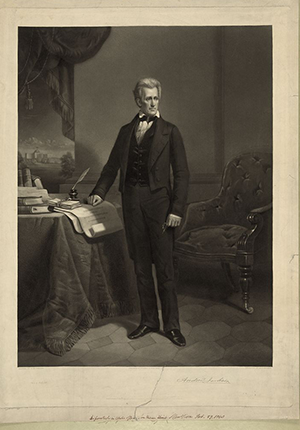Historic Document
Indian Removal Act (1830)
Congress | 1830

Library of Congress, Prints and Photographs Division
Summary
Signed into law on May 28, 1830, by United States President Andrew Jackson, the Removal Act authorized the president to negotiate with Native American tribes for federal territory west of the Mississippi River in exchange for Indian lands within existing state borders. Although some tribes accepted the Act, others such as the Cherokees resisted. During the Fall and Winter of 1838-39, the Cherokee were forcibly removed by the United States government in a march that later became known as the Trail of Tears.
Selected by

Laura F. Edwards
Class of 1921 Bicentennial Professor in the History of American Law and Liberty, and Professor of History at Princeton University

Kurt Lash
E. Claiborne Robins Distinguished Professor of Law at the University of Richmond
Document Excerpt
CHAP. CXLVIII. - An Act to provide for an exchange of lands with the Indians residing in any of the states or territories, and for their removal west of the river Mississippi.
Be it enacted by the Senate and House of Representatives of the United States of America, in Congress assembled, That it shall and may be lawful for the President of the United States to cause so much of any territory belonging to the United States, west of the river Mississippi, not included in any state or organized territory, and to which the Indian title has been extinguished, as he may judge necessary, to be divided into a suitable number of districts, for the reception of such tribes or nations of Indians as may choose to exchange the lands where they now reside, and remove there; and to cause each of said districts to be so described by natural or artificial marks, as to be easily distinguished from every other.
SEC. 2. And be it further enacted, That it shall and may be lawful for the President to exchange any or all of such districts, so to be laid off and described, with any tribe or nation of Indians now residing within the limits of any of the states or territories, and with which the United States have existing treaties, for the whole or any part or portion of the territory claimed and occupied by such tribe or nation, within the bounds of any one or more of the states or territories, where the land claimed and occupied by the Indians, is owned by the United States, or the United States are bound to the state within which it lies to extinguish the Indian claim thereto.
SEC. 3. And be it further enacted, That in the making of any such exchange or exchanges, it shall and may be lawful for the President solemnly to assure the tribe or nation with which the exchange is made, that the United States will forever secure and guaranty to them, and their heirs or successors, the country so exchanged with them; and if they prefer it, that the United States will cause a patent or grant to be made and executed to them for the same: Provided always, That such lands shall revert to the United States, if the Indians become extinct, or abandon the same.
…
APPROVED, May 28, 1830.




